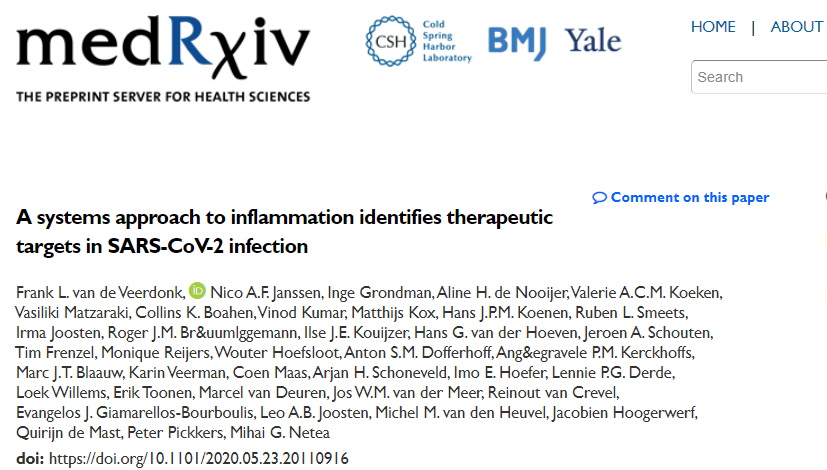Protein biomarkers of COVID-19 pathophysiology - a collaboration with Radboud UMC in the Netherlands
Pre-print now available: Olink collaboration with the Division of Infectious Diseases of the Department of Internal Medicine, Radboud University Medical Center, Nijmegen
Background
Identifying protein biomarkers in patients with SARS-CoV-2 infection is crucial to identify the pathophysiology of the COVID-19 disease and design treatments that target these mechanisms.
Findings
Researchers from the Radboud UMC have used targeted proteomics combined with a systems biology approach to investigate the inflammatory and other biomarkers that characterize COVID-19, and identify the pathways that contribute to severity of the disease. In order to make this important data available to the wider scientific community as soon as possible, they have made a preprint available on medRxiv: van der Veerdonk et al, (2020) medRxiv DOI: 10.1101/2020.05.23.20110916) – see the article here
In this study, the researchers decided to go well beyond “the usual suspects” already implicated in severe COVID-19 (IL-6, TNFα etc) and looked at ~270 additional inflammatory and cardiometabolic proteins using three Olink panels. As well as confirming some previously observed features of patients with severe responses to SARS-CoV-2 infection, important new pathways invovled in the pathophysiology of severe COVID-19 were identified, illustrating the importance of looking at many different proteins to make novel or unexpected discoveries. Some key points:
- identified several major inflammatory pathways that discriminate between severely ill patients and patients with mild disease (potential starting points for therapeutic targeting)
- protein profiles show that patients cluster according to disease severity but seem to share the same underlying pathophysiological mechanism
– no stratification of patients based on different inflammatory endotypes - major pathophysiological pathways/proteins identified: IL-1/IL-6 pathway, anti-apoptotic and proliferative factors, complement, and the kinin-kallikrein system
- one novel and exciting finding to highlight was significant differences in the factors involved in the kinin-kallikrein system (plays an important role in the local inflammation in the lung)
- also saw a strong down-regulation of stem cell factor (SCF) in severe COVID-19 patients, which may contribute to the lymphopenia that accompanies a poor outcome
The research team from the Division of Infectious Diseases at Radboud UMC were able to obtain this data within a few weeks of initiating the project with Olink, and will extend this longitudinal study further in order to build the rationale for specific treatment strategies based on the pathophysiological mechanisms involved.
About the Principle Investigators

Professor Leo Joosten is as pathobiologist interested in host defence mechanisms triggered by pathogenic microorganisms that results in chronic inflammation.
Apart from infectious diseases, he also works on metabolic-related diseases such as diabetes type 2, atherosclerosis and gouty arthritis.
Professor Joosten is head of the laboratory of experimental medicine and staff member of the department of medicine, and has authored more than 500 scientific publications (see examples here).
You can also read more about what Professor Joosten has to say about this study, and the wider efforts of the team at Raboud UMC in an editorial article on SelectScience – READ THE ARTICLE
Professor Mihai Netea is an infectious disease specialist who currently heads the division of Experimental Medicine, Department of Internal Medicine, Nijmegen University Nijmegen Medical Center.
His main research interests are pattern recognition of fungal pathogens and the induction of antifungal immunity, primary immunodeficiencies in innate immune system, and the study of the memory traits of innate immunity.
Professor Netea has authored more than 1000 scientific publications – see details here
Doctor Frank van de Veerdonk is an Infectious Disease specialist at the Radboudumc and Radboud Center for Infectious diseases (RCI).
Dr. van de Veerdonk has authored more than 150 scientific publications – see details here
